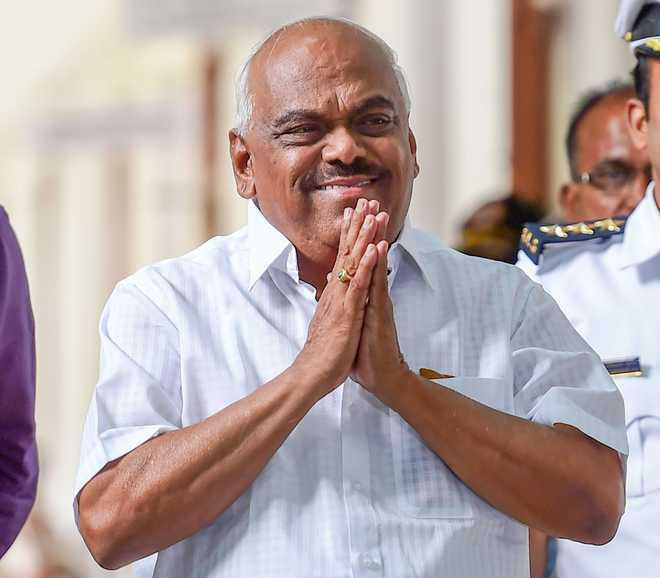The political crisis in Karnataka appears to be testing the limits of judicial restraint exercised by the Supreme Court with regard to powers of the Assembly Speaker.
Unlike other occasions, when the Speaker’s alleged misuse of power under the anti-defection law had been under judicial scrutiny, this time around the issue is slightly complicated.
Apart from his powers under the anti-defection law, inordinate delay on his part in taking decisions over the resignation by 15 rebel MLAs of the ruling Congress-JD(S) coalition has raised “weighty” constitutional questions.
The 15 rebel MLAs have moved the top court seeking a direction to Speaker KR Ramesh Kumar to accept their resignations. On his part, Kumar has maintained that he was required to ascertain genuineness of the resignations before taking any decision and that he would first decide the issue of their disqualification under the anti-defection law i.e. 10th Schedule of the Constitution.
In the process, the Speaker chose to ignore the court’s July 11 order to decide on the resignations forthwith. The very next day, a Bench headed by Chief Justice of India Ranjan Gogoi asked the Speaker to maintain status quo till the next date of hearing as it agreed to examine “weighty” constitutional issues involved in the resignations and disqualification proceedings against the rebel MLAs.
What was ordered by the Supreme Court on July 17 has hardly helped to solve the crisis. While giving liberty to rebel MLAs not to participate in the trust vote, it also said the Speaker might decide on the resignation as and when he wanted.
Notwithstanding the SC assertions that the interim order was aimed at maintaining “constitutional balance”, the fact is that it only highlights its dilemma in dealing with the office of the Speaker.
There is no doubt that the office of Speaker of an Assembly is very important in the constitutional scheme. While upholding the validity of the 10th Schedule, the Supreme Court had in Kihoto Hollohan vs Zachillhu and Others (1991) said, “The office of the Speaker is held in the highest respect and esteem in parliamentary traditions...tit is inappropriate to express distrust in the high office of the speaker, merely because some of the speakers are alleged, or even found, to have discharged their functions not in keeping with the great traditions of that high office. The robes of the Speaker do change and elevate the man inside.”
But it’s equally true that the Supreme Court had to deal with errant speakers as well. In 1993, it was forced to direct the Central Government to produce Manipur Speaker Dr H Borobabu Singh in person before it for contempt of court.
During the hearing on petitions filed by rebel MLAs of Karnataka’s ruling coalition, the CJI raised questions over the conduct of the Speaker. Noting that the Constitution gave an exalted position to the Speaker and it was recognised so by the SC in Kihoto Hollohan’s case, the CJI indicated that the powers of the Speaker needed to be examined as the experience of the past more than two decades had not been very good.
The Karnataka crisis has thrown up several questions for consideration: What if the Speaker does not accept the resignation of an MLA? What is the recourse available to the Speaker, if disqualification proceedings have been imitated against an MLA who has resigned? Should the Speaker accept the resignation, thereby making the disqualification proceedings infructous or keep the resignation pending and proceed with the disqualification proceedings?
This is important because Article 190(3) only requires the Speaker to see if the resignation is genuine and voluntary, while he is needed to hold a sort of trial under the anti-defection law.
These are some of the “weighty” questions confronting the SC even as the Speaker asserts his right to take his own decisions on the resignations and disqualifications. The top court’s answer to these constitutional questions will have political consequences for the HD Kumaraswamy government fighting for its survival and guidance for such crises in future.
Questions for consideration
- What if Speaker does not accept the resignation of an MLA?
- What is the recourse available to the Speaker, if disqualification proceedings have been imitated against an MLA who has resigned?
- Should the Speaker accept the resignation, thereby making the disqualification proceedings infructous or keep the resignation pending and proceed with the disqualification proceedings?
Unlock Exclusive Insights with The Tribune Premium
Take your experience further with Premium access.
Thought-provoking Opinions, Expert Analysis, In-depth Insights and other Member Only Benefits
Already a Member? Sign In Now











